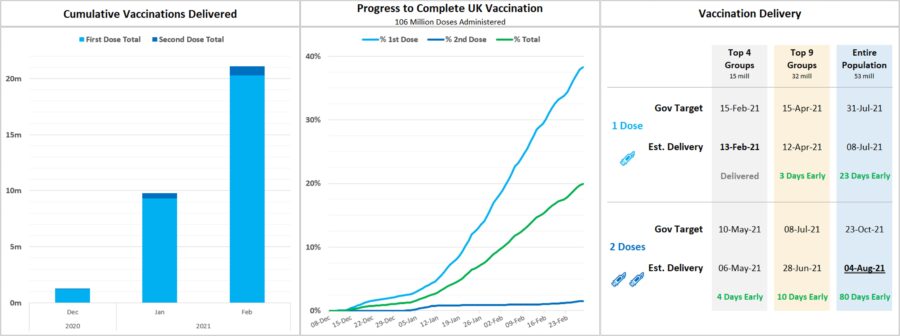The UK has set out its steps to reduce coronavirus restrictions. It’s hoped the fantastic progress of the vaccination programme will mean this is the last COVID-19 lockdown in the UK.
We’ve been told that decisions will be informed by the data, so let’s dig into the stats!
Cases – and the rate of infection
Cases have been dropping for the last seven weeks, from a high of 414k confirmed cases in Week 44 – 4th of Jan to 10th of Jan. The ONS estimated 1 in 50 people had the virus in England in the last week of 2020. That’s now dropped to 1 in 145 people.
The rate of infection (the “R” rate) has been below 1 for seven weeks now – by my estimates, which are based on the reported positive test results.
An “R” of 0.9 means every 100 people with the virus, infect a further 90. An “R” of 1.1 means those 100 people instead infect 110 people.
Cases are going in the right direction, although I’d argue it’s not cases that matter anymore.
Hospital Patients
The reason we’ve all been asked to “Stay at home” is to “Protect the NHS” and “Save lives”. The more people who get ill with coronavirus, the more pressure that puts on the National Health Service.
It’s okay to have COVID-19 cases if nobody goes to hospital. Thanks to the vaccine roll-out, fewer people are, and here’s a great visual tweet explaining why.
Vaccination almost completely eliminates the chance of getting severe or moderate symptoms!
There are still significant numbers of people in hospital, but it’s now less than half the peak and dropping further.
Deaths
The vaccine will reduce hospital admissions, but it’ll also reduce deaths – even more significantly so.
Even a single dose of the Oxford-AstraZeneca and Pfizer-BioNTech vaccines is proving to have a significant impact on immunity to COVID-19. This is great news and will be contributing to the rapid fall in deaths in the UK.
In just five weeks, the UK has gone from ~8.7k coronavirus deaths a week to ~2.3k. To put that in perspective, around 3.2k people sadly die from cancer each week.
Vaccines
Here’s why the UK has been able to set-out it’s roadmap out of lockdown: the vaccine roll-out.
The UK is vaccinating the entire adult population (53 million people) meaning it needs to administer 106 million vaccinations.
So far over 1 in 3 people have had their first dose, and the programme is already over 20% complete.

If the UK continues to roll-out vaccinations at the current rate, it’s set to meet, if not exceed its targets to re-open the country.
All the data I’ve shared in this post comes from the UK Gov Coronovirus Dashboard. Predictions are based on my interpretation of this data and vaccine supply data.


